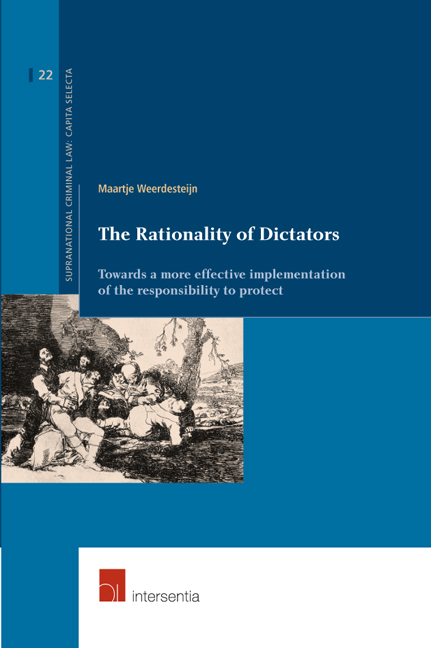 The Rationality of Dictators
The Rationality of Dictators from Part II - The Comparative Case Study
Published online by Cambridge University Press: 28 September 2018
INTRODUCTION
Ironically, the names of the couple that led the country into political and economic chaos referred to freedom and peace. Slobodan signifies freedom and Milosevic would become known as ‘Sloba-Sloboda’ no longer merely referring to the name, but relating it to the concept itself. His wife Mirjana, who would later also become a prominent figure in Serbian politics, carries a name which is a derivative from Mir (peace) (Stevanovic, 2004, p. 1; 5). Their legacy could not have been more different. As Chapter 8 argued, Milosevic was influential in orchestrating Yugoslavia's demise and the bloodshed that came along with it.
Milosevic in the past has been labelled a cold apparatchik, referred to as ‘the slickest con man in the Balkans’, has been called the ‘devil of Dedinje’ and eventually would be known as ‘the butcher of the Balkans’ (Post, 2004, p. 179; Stevanovic, 2004, p. 1). In those scenarios Milosevic is often portrayed as a ‘dangerous mad man’ (translated from Detrez, 2002, p. 7) and has been described as ‘neurotic’ (Stevanovic, 2004, p. 2). However, there are no indications Milosevic was actually mad and conclusions that a leader suffers from mental disorders need to be handled with care. As Detrez points out, any policy – especially those coming from the international community – is not served by the perception of the other as crazy (Detrez, 2002, pp. 7-8). While strong indications of a particular psychological disorder may be very telling and can be taken into account when devising foreign policy, (e.g. Glad, 2002) if this is merely an assumption that has no basis, as appears to have been the case with Milosevic, it can be very counterproductive. It is also questionable to what extent this was merely an image painted of Milosevic in the popular media or whether it actually impacted diplomats and other politicians. Anecdotal evidence seems to indicate that they did not perceive Milosevic as crazy or suffering from serious mental disorders. Quite the opposite, at least by 1993 Milosevic was seen by foreign diplomats as someone with whom it was possible to negotiate and reach an understanding (Doder & Branson, 1999, p. 89). The present chapter will use the work of Max Weber to assess the extent to which either of the two types of rationality, dominated the decision-making process of Milosevic throughout his life.
To save this book to your Kindle, first ensure [email protected] is added to your Approved Personal Document E-mail List under your Personal Document Settings on the Manage Your Content and Devices page of your Amazon account. Then enter the ‘name’ part of your Kindle email address below. Find out more about saving to your Kindle.
Note you can select to save to either the @free.kindle.com or @kindle.com variations. ‘@free.kindle.com’ emails are free but can only be saved to your device when it is connected to wi-fi. ‘@kindle.com’ emails can be delivered even when you are not connected to wi-fi, but note that service fees apply.
Find out more about the Kindle Personal Document Service.
To save content items to your account, please confirm that you agree to abide by our usage policies. If this is the first time you use this feature, you will be asked to authorise Cambridge Core to connect with your account. Find out more about saving content to Dropbox.
To save content items to your account, please confirm that you agree to abide by our usage policies. If this is the first time you use this feature, you will be asked to authorise Cambridge Core to connect with your account. Find out more about saving content to Google Drive.